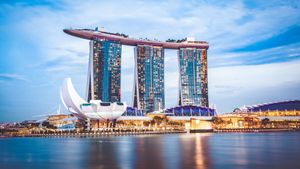
Discover the Basics of Sustainable Cooling and Energy-Efficient Technologies
Singapore has become one of the most visited destinations in Asia, attracting millions of tourists each year with its blend of cultural diversity, modern infrastructure, and vibrant lifestyle. For many travelers, planning a trip can be overwhelming—balancing flight bookings, hotel reservations, sightseeing, and transportation. This is why travel and hotel packages exist: to simplify planning by bundling flights, accommodations, and sometimes tours into a single deal.
Singapore has become one of the most seen sites in Asia, which attracts millions of tourists each year with a mix of cultural diversity, modern infrastructure and living lifestyle. For many passengers, it can be difficult to plan a trip, hotel reservation, travel to sightseeing and transport. This is why travel and hotel packages exist: Simplifying the plan for planning aircraft, housing and sometimes tourism in the same agreement.
These packages meet different groups of passengers, including families seeking comfort, professional professionals seeking efficiency, and the facilities that provide single travelers.

Meaning – Benefits and Solving Challenges
The journey may include unexpected costs and logical challenges. Hotel packages in Singapore help solve these problems:
-
Cost exception: Passengers can estimate total expenses.
-
Time savings: Order package saves time compared to the management of separate reservation.
-
Curred experience: The package often consists of attractions such as Marina Bay Sands Skypark, Garden by the Bay or Singapore Zoo.
-
Diversity of housing: From luxury hotels to favorable budgeting, packages let passengers choose on the basis of needs.
These benefits not only affect tourists, but also the hospitality region, which depend on the bundle agreements to attract visitors during the extreme and off-picking season.
Recent Update – Trends in 2024–2025
Over the past year, Singapore has seen many changes in its travel and hospitality region:
-
Digital-Fund Order (2024): Travel platforms such as Exposedia, Booking DOT com and local agencies quickly offer mobile app-exclusive offers.
-
Sustainability Focus (2025): Environmentally friendly hotel stays, such as Santosa and Central Business District, have gained popularity. Hotel uses green practice as energy efficiency and waste deficiency.
-
Post-Pandik Demand Recovery: Tourist Arrival to Singapore increased significantly in 2024, and crossed the level of NR-2020, highlighting Global interest fresh.
-
Flexible Illation policies: Many hotel packages now include flexible booking options to adjust unsafe travel plans.
Laws or Guidelines – Rules Affecting Singapore Visits
Singapore passengers should know about many government rules and policies:
-
Visa requirements: Residents in most countries can enter Singapore without visas on short trips (usually up to 30 days). However, some nationalities require a visa before the stage.
-
Travel insurance: Although it is not compulsory, travel insurance is highly recommended and sometimes gathered in Premium packages.
-
Hotel regulations: All hotels must be licensed under Singapore's hotel license controls, and ensure security and service standards.
-
Tourism tax: The hotel stay includes a goods and service fee (GST), which is usually reflected in the prices of the package.
-
Initiative for stability: Singapore's tourism board promotes environmental environment and controls practice to ensure environmental protection.
Common Questions – General Questions about Singapore Travel and Hotel Package
Q1: What is usually included in the travel package in Singapore?
Most of the packages include flights, lives in hotels and sometimes airports transfer. Some guided tourism, attraction tickets or food credit also provide.
Q2: Is it cheaper to order your own package or book?
It depends on the weather and the supplier. Packages often save money during extreme travel, but flexible passengers can get cheap separate orders during the off-pickers months.
Q3: When is the best time to travel to Singapore?
Singapore is a tropical climate year-round. However, popular times are June to August and December, when festivals and programs attract more tourists. Like February or September, off-a-picker months can offer better offers.
Q4: Are hotel packages available for commercial passengers?
Yes. Many packages include access to business centers, high-speed Wi-Fi and proximity in the Financial District of Singapore, making them suitable for migration of companies.
Q5: Does hotel packages in Singapore local attraction?
Some do. The package may include entry on popular websites such as Universal Studio Singapore, Night Safari or Chinatown and Little India.
Conclusion
Singapore is one of the most important places in Asia for both holidays and commercial passengers. Hotels and travel packages provide a practical way to discover the city, and ensure cost-effectiveness, time savings and curators experiences. With recent trends such as permanent tourism and flexible booking policy, travelers now have more sewn alternatives than ever.
Current updates, by understanding legal requirements and available resources, visitors can make informed decisions and enjoy a regular travel experience. Either for a small city brake or a longer holiday, Singapore's hospitality industry offers package to meet different requirements and expectations.










